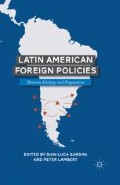Abstract
Since 1979 the governments of Nicaragua have had clear ideological predispositions. When the Sandinistas (FSLN, Sandinista National Liberation Front) govern they tend toward the radical left, as witnessed between 1979 and 1990 and from 2006 until the present. During the intervening period, with the rightist administrations of UNO (National Union of the Opposition, 1990–1996) and the PLC (Constitutional Liberal Party, 1996–2006) in power, the tilt is toward the free-market right. In each case, ideological motives are clearly visible in domestic and foreign affairs, but generally more clearly on the domestic side. In foreign affairs Nicaraguan governments have been pragmatic ideologues.
Access this chapter
Tax calculation will be finalised at checkout
Purchases are for personal use only
Preview
Unable to display preview. Download preview PDF.
Notes
One work estimates the size of a country’s political elite at under one-tenth of 1 percent of the population. See, Michael Burton, Richard Gunther, and John Higley, “Introduction: Elite Transformations and Democratic Regimes,” 1–37, in Elites and Democratic Consolidation in Latin America and Southern Europe, ed. John Higley and Richard Gunther, Cambridge: Cambridge University Press, 1992.
Carlos Esucudé, “An Introduction to Peripheral Realism and Its Implications for the Interstate System: Argentina and the Condor II Missile Project,”, International Relations Theory and the Third World, ed. Stephanie Neuman, New York; St. Martin’s Press, 1998, 55–76.
Mohammed Ayoob, “Subaltern Realism: International Relations Theory Meets the Third World,”, International Relations Theory and the Third World, ed. Stephanie Neuman, New York; St. Martin’s Press, 1998, 31–54.
JoAnn Fagot Aviel, “Nicaragua: Foreign Policy in the Revolutionary and Post-revolutionary Era,”, latin American and Caribbean Foreign Policy, ed Frank O’Mora and Jeanne A. K. Hey, 46–62, Lanham, MD: Roman & Littlefield, 2003, 46.
Jack Child, The Central American Peace Process: Sheathing Swords, Building Confidence, Boulder: Lynne Rienner, 1992.
For details, see David Close, Nicaragua: the Chamorro Years, Boulder, CO: Lynne Rienner Publishers, 1999, 45–48; 76–77.
David R. Dye and David Close, “Patrimonialism and Economic Policy in the Aleman Administration,”, Undoing Democracy: The Politics of Electoral Caudillismo, ed David Close and Kalowatie Deonandan, 119–41, Lanham, MD: Lexington Books, 2004.
Nicaragua Network, Hurricane Mitch Alert, No.1, November 2, 1998, http://www.nicanet.org; accessed November 4, 1998.
Quoted in Nitlapan-Envio Team, “Our Place in the World,” Envio, 262, May 2003, http://www.envio.org.ni/articulo/2090; accessed November 1, 2008.
Nitlapan-Envio Team, “Back from Iraq,” Envio, 272, March 2004, http://www.envio.org.ni/articulo/2154; accessed March 19, 2009.
Nitlapan-Envio Team, “The ‘Powell Effect’ on Three Political Forces,” Envio, 268, November 2003, http://www.envio.org.ni/articulo/2129; accessed October 29, 2008.
BBC News, “Deal to End Crisis in Nicaragua,” November 11, 2005; http://news.bbc.co.uk/2/hi/americas/4329688.stm; accessed November 1, 2008. In 2000, Aleman and Ortega signed the Pact, a deal between the two parties to turn Nicaragua’s courts, electoral authority, and comptroller’s office into partisan instruments. The Pact reduced executive accountability and gave the Sandinistas and Liberals effective control over much of Nicaraguan politics.
Joseph Contreras, “All Signs Suggest Chastened Sandinista Firebrand Will Embrace Moderation,” Newsweek, December 25, 2006-January 1, 2007, http://www.msnbc.msn.com/id/l624l591/site/newsweek; accessed December 28, 2006.
A list of projects is found in Tim Rogers, “Ortega Balances Venezuelan Aid, IMF,” Nica Times, April 27-May 3, 2007, http://www.nicatimes.net; accessed May 7, 2007; the US$385 million figure was reported by Alfonso Martinez, “la ayuda de Venezuela asciende a 385 millones de dólares,” La voz del sandinismo, 30 de enero de 2008, http://www.lavozdelsand-inismo.com/nicaragua/2008-01-30/la-ayuda-de-venezuela-a-nicaragua-asciende-a-385-millones-de-dolares/; accessed November 1, 2008.
Ricardo Castillo Argüello, “La economía Política de los petrodólares,” Confidential, 606 (19 al 25 de octubre de 2008), 14 [1, 13–14].
Nicaragua Network, “Two Foreign Interventions Draw Angry Responses from Government,” NicaNet, August 19, 2008, http://www.nicanet.org/?p=548; accessed August 24, 2008.
José Adáan Silva, “Cayó como bomba en Unión Europea,” El Nuevo Diario, 31 de octubre de 2008, http://www.elnuevodiario.com.ni/nacionales/31153; accessed October 31, 2008.
Rory Carroll, “Oxfam Targeted as Nicaragua Attacks ‘trojan Horse’ NGOs,” The Guardian, October 14, 2008, http://www.guardian.co.uk/world/2008/oct/l4/humanrights-voluntarysector; accessed October 14, 2008. The formal basis for the charge was that Oxfam sent part of its program funds to CINCO, a research centre, which then gave part ofthat money to an organization (the MAM, Movimiento Autónomo de Mujeres) that was not legally incorporated and should not have received funds from Oxfam. The case was dropped without explanation in 2009.
Blake Schmidt, “Ortega Accuses US, Europe of Colonialism for Freezing Aid,” Nica Times, December 12–18, 2008, http://www.nicatimes.net; accessed December 12, 2008.
Lourdes Arróliga, “Shinishi Saito, Embajador de Japón: No existe coop-eración sin condiciones,” Confidential, 622 (del 22 a 28 de febrero de 2009), 1, 4–5.
Eddy López, “Callahan ‘non grato’ en León,” La Prensa, 26 de marzo de 2010, http://www.laprensa.com.ni/2010/03/26/departamentos/20316; accessed March 26, 2010.
Editor information
Editors and Affiliations
Copyright information
© 2011 Gian Luca Gardini and Peter Lambert
About this chapter
Cite this chapter
Close, D. (2011). Nicaragua’S Pragmatic Ideologues. In: Gardini, G.L., Lambert, P. (eds) Latin American Foreign Policies. Palgrave Macmillan, New York. https://doi.org/10.1057/9780230118270_12
Download citation
DOI: https://doi.org/10.1057/9780230118270_12
Publisher Name: Palgrave Macmillan, New York
Print ISBN: 978-1-349-29355-1
Online ISBN: 978-0-230-11827-0
eBook Packages: Palgrave Political & Intern. Studies CollectionPolitical Science and International Studies (R0)

